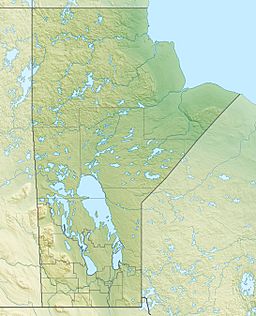Whitemouth Lake facts for kids
Quick facts for kids Whitemouth Lake |
|
|---|---|
| Location | Eastman Manitoba |
| Coordinates | 49°16′40″N 95°41′50″W / 49.27778°N 95.69722°W |
| Primary outflows | Whitemouth River |
| Basin countries | Canada |
| Islands | 3 |
Whitemouth Lake is a freshwater lake found in the Eastman Region of Manitoba, Canada. It is located in the southeastern part of the province, quite close to both the United States and Ontario borders.
Contents
Whitemouth Lake: A Manitoba Gem
Whitemouth Lake is a large but shallow lake. It is an important natural feature in the area. The lake is mainly fed by water that comes from underground springs. This means water flows into the lake from beneath the ground.
Where is Whitemouth Lake?
The lake is located within the Rural Municipality of Reynolds. A "Rural Municipality" is a type of local government area, like a county or district. The Rural Municipality of Piney is also found along the western side of the lake.
The water from Whitemouth Lake flows out into the Whitemouth River. A "tributary" is a smaller river or stream that flows into a larger river. The Whitemouth River is a large tributary of the Winnipeg River. This means the Whitemouth River adds its water to the bigger Winnipeg River.
What's Special About the Lake?
Whitemouth Lake is home to the Whitemouth Island Ecological Reserve. An "Ecological Reserve" is a special protected area. It is set aside to keep nature safe and untouched. This reserve has a very old and beautiful "Great Lakes hardwood forest." This type of forest has many trees with hard wood, like oak and maple. It is a rare and important natural area.
Fishing and Wildlife
Whitemouth Lake is a popular spot for "recreational fishing." This means people come to the lake to fish for fun. A very popular fish to catch here is the walleye.
However, because the lake is shallow and has many nutrients, it can sometimes have problems. During winter, when the lake freezes over, the amount of oxygen in the water can get very low. When oxygen supplies "dwindle," it means they become very small. This can lead to "winter die-offs" of fish. This means many fish might not survive the winter due to a lack of oxygen.
 | Misty Copeland |
 | Raven Wilkinson |
 | Debra Austin |
 | Aesha Ash |


